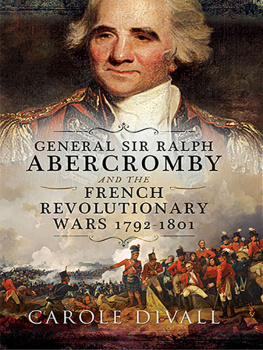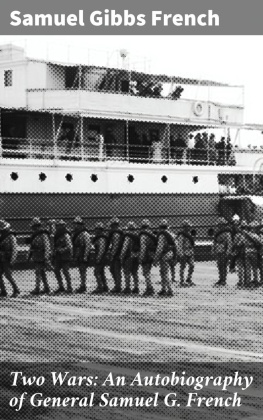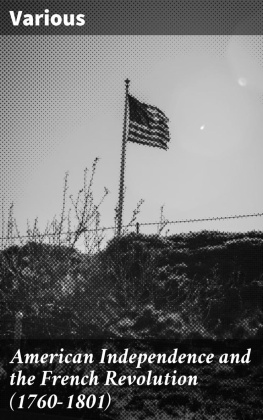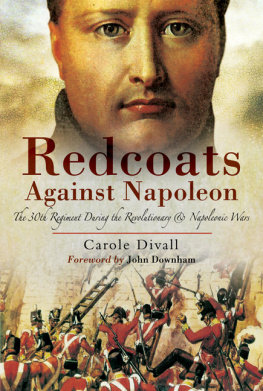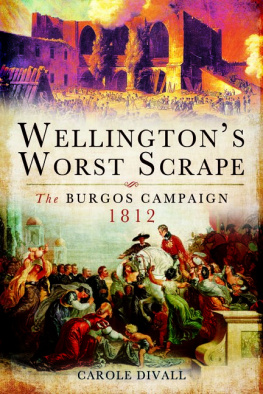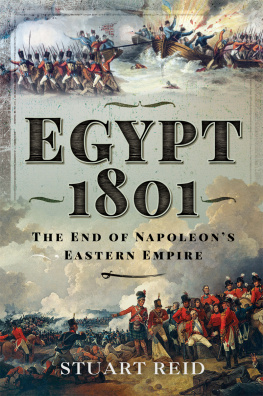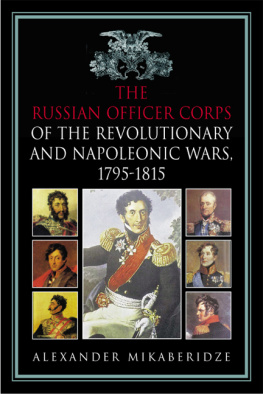Divall Carole - General Sir Ralph Abercromby and the French Revolutionary Wars, 1792-1801
Here you can read online Divall Carole - General Sir Ralph Abercromby and the French Revolutionary Wars, 1792-1801 full text of the book (entire story) in english for free. Download pdf and epub, get meaning, cover and reviews about this ebook. year: 2019, publisher: Pen & Sword Books Limited, genre: History. Description of the work, (preface) as well as reviews are available. Best literature library LitArk.com created for fans of good reading and offers a wide selection of genres:
Romance novel
Science fiction
Adventure
Detective
Science
History
Home and family
Prose
Art
Politics
Computer
Non-fiction
Religion
Business
Children
Humor
Choose a favorite category and find really read worthwhile books. Enjoy immersion in the world of imagination, feel the emotions of the characters or learn something new for yourself, make an fascinating discovery.
- Book:General Sir Ralph Abercromby and the French Revolutionary Wars, 1792-1801
- Author:
- Publisher:Pen & Sword Books Limited
- Genre:
- Year:2019
- Rating:3 / 5
- Favourites:Add to favourites
- Your mark:
- 60
- 1
- 2
- 3
- 4
- 5
General Sir Ralph Abercromby and the French Revolutionary Wars, 1792-1801: summary, description and annotation
We offer to read an annotation, description, summary or preface (depends on what the author of the book "General Sir Ralph Abercromby and the French Revolutionary Wars, 1792-1801" wrote himself). If you haven't found the necessary information about the book — write in the comments, we will try to find it.
Divall Carole: author's other books
Who wrote General Sir Ralph Abercromby and the French Revolutionary Wars, 1792-1801? Find out the surname, the name of the author of the book and a list of all author's works by series.
General Sir Ralph Abercromby and the French Revolutionary Wars, 1792-1801 — read online for free the complete book (whole text) full work
Below is the text of the book, divided by pages. System saving the place of the last page read, allows you to conveniently read the book "General Sir Ralph Abercromby and the French Revolutionary Wars, 1792-1801" online for free, without having to search again every time where you left off. Put a bookmark, and you can go to the page where you finished reading at any time.
Font size:
Interval:
Bookmark:

General Sir Ralph Abercromby and the French Revolutionary Wars 1792-1801
John Divall In memoriam
General Sir Ralph Abercromby and the French Revolutionary Wars 1792-1801
Carole Divall

First published in Great Britain in 2018 by
PEN & SWORD MILITARY
An imprint of
Pen & Sword Books Ltd
Yorkshire Philadelphia
Copyright Carole Divall 2018
ISBN 9781526741462
eISBN 9781526741479
Mobi ISBN 9781526741486
The right of Carole Divall to be identified as Author of this work has been asserted by her in accordance with the Copyright, Designs and Patents Act 1988.
A CIP catalogue record for this book is available from the British Library
All rights reserved. No part of this book may be reproduced or transmitted in any form or by any means, electronic or mechanical including photocopying, recording or by any information storage and retrieval system, without permission from the Publisher in writing.
Pen & Sword Books Ltd incorporates the Imprints of Aviation, Atlas, Family History, Fiction, Maritime, Military, Discovery, Politics, History, Archaeology, Select, Wharncliffe Local History, Wharncliffe True Crime, Military Classics, Wharncliffe Transport, Leo Cooper, The Praetorian Press, Remember When, White Owl, Seaforth Publishing and Frontline Publishing.
For a complete list of Pen & Sword titles please contact
PEN & SWORD BOOKS LTD
47 Church Street, Barnsley, South Yorkshire, S70 2AS, England
E-mail:
Website: www.pen-and-sword.co.uk
Or
PEN & SWORD BOOKS
1950 Lawrence Rd, Havertown, PA 19083, USA
E-mail:
Website: www.penandswordbooks.com
List of Illustrations
- Sir Ralph Abercromby after Hoppner. (Authors collection)
- Sir John Moore from The Royal Military Chronicle. (Authors collection)
- William Pitt the Younger. (National Portrait Gallery)
- Henry Dundas. (National Portrait Gallery)
- William Wyndham Grenville, 1st Lord Grenville. (National Portrait Gallery )
- The Duke of York at the Siege of Valenciennes, 1793. (Anne S.K. Brown Collection )
- The Battle of Tourcoing, 1794. (Alamy)
- The Winter Retreat, 1795. (Alamy)
- The 27th (Inniskillings) take Morne Fortun, 24 May 1796. (The Inniskillings Museum)
- The Capture of Trinidad, 18 February 1797 by Nicholas Pocock. (Public domain )
- John Jeffreys Pratt, 1st Marquis Camden, by William Salter. (Public domain )
- British troops under General Abercromby landing in North Holland, 27 August 1799. (Courtesy of Michael Crumplin)
- The Battle of Egmont, 2 October 1799, after Jan Langendyk. (Public domain )
- The departure of the Anglo-Russian Expedition from North Holland, November 1799. (Authors collection)
- Aboukir Bay, March 1801. (Authors collection)
- British troops landing at Aboukir, 8 March 1801 by Philip James de Loutherbourg. (Anne S.K. Brown collection)
- The Death of General Sir Ralph Abercromby K.B., after Thomas Stothard. (Anne S.K. Brown Collection)
Introduction
A NATIONAL REVOLUTION brought about in a period so short, has had no parallel in the history of the World: and though fatal to some, the lives that have been lost in this great accomplishment, are in point of numbers, inconsiderable...
The popular tumult spreads far and wide: but the triumph of the PARTY is now complete.
Three hundred thousand men are in arms.
After committing various acts of violence, the Party attacked the Bastile, which they soon broke open; and similar to the Riots in the year 1780 with us, all the prisoners were set at liberty. Here, at this moment, scenes as novel and as interesting took place, as ever history recorded. Here , Friends long lost again met each other! Here CAPTIVITY regained its freedom and DESPAIR found instant consolation! ...
As soon as the PARTY had destroyed the Bastile, they seized the GOVERNOR Monsieur DE LAUNET, and carrying him forth, beheaded him in the sight of the people, and parting the head, all bleeding as it was, upon a pole, bore it before them...
T hus The World summed up the events in Paris in the summer of 1789, events which were to have a cataclysmic effect on France, on the rest of Europe and on the world beyond.
Whether Ralph Abercromby, a Scottish half-pay officer, read the news in the hyperbolic style of The World or in a more sober form, it would certainly have given him pause for thought. France had been in a state of tension for some time. As a man of liberal sympathies, he could not but welcome the news of an attack on the monolithic power of the French crown; but he must have been well aware of the dangerous power of King Mob, memorably witnessed on the streets of London nine years before during the Gordon Riots. He also possessed a pragmatic understanding that liberty was a dangerous weapon and needed to be handled with discretion. Consequently, he feared that the French people were not sufficiently instructed to submit to the sober guidance of a Washington, and that they required to be controlled by a firm and energetic hand... until they could be gradually trained to the exercise of freedom; since, if they were not restrained, the result might be perilous to them, might obstruct the progress of freedom, and involve the rest of Europe in serious embarrassments. What he could not have known was the part he would be called upon to play in the convulsions that followed the events of 14 July 1789.
Major General Ralph Abercromby (as he was in 1789) had been born in October 1734, when the French-backed adherents to the Stuart cause were still the biggest threat to Scotland, and to Britain. He was the first surviving son of George Abercromby of Tullibody, who was the largest landowner in the, admittedly small, county of Clackmannan. Through his mother, Mary Dundas, he was connected to an ambitious family that would come to dominate Scottish politics by the end of the eighteenth century. The Abercrombys were by profession lawyers or soldiers. The former was the profession chosen by George Abercromby for his eldest son. After being privately educated at home, he attended Mr Moirs school in Alloa and then Rugby, before entering Edinburgh University in 1752 to study moral and natural philosophy and civil law. According to a fellow student, he punctually performed those tasks that were required of him, and he gave much satisfaction to the professors, who regarded him as a youth of sound rather than brilliant parts, and who bid fair to obtain distinction in the pursuits of active life.
If active is the key word here, then there is the suggestion that a lawyers life might not be an ideal choice. So it proved. In 1754 he was sent to Leipzig to study civil law. He returned with a determined wish for a career not as a lawyer but as a soldier; and was eventually able to persuade his reluctant father to purchase for him a commission in the 3rd Dragoon Guards. Two years later, upon the outbreak of the Seven Years War (175663), he went with his regiment to Germany and was appointed aide-de-camp to Sir William Pitt, a position which gave him a better appreciation of the business of war than he would have acquired as merely a junior officer. As a result he returned to Britain not only as captain, by purchase, but also as a disciple of Prince Ferdinand of Brunswick, from whom he had learnt the importance of balancing strict discipline with concern for the welfare of his men.
There followed twelve quiet years during which he was promoted first to major in 1770, then to lieutenant colonel in 1773, the year that saw the outbreak of war with the North American Colonists. This confronted Abercromby with a crisis of conscience. As a soldier it was his duty to serve his country: as a man of principle he recognized the validity of the Colonists arguments. He was not alone in coming to the conclusion that in this instance, when Britain herself was not under threat, principle must win over duty, even at the cost of his career. He let it be known that he would refuse any appointment to serve in North America, unlike his younger brother, Robert, colonel of the 37th Foot, who played an active part in the war.
Next pageFont size:
Interval:
Bookmark:
Similar books «General Sir Ralph Abercromby and the French Revolutionary Wars, 1792-1801»
Look at similar books to General Sir Ralph Abercromby and the French Revolutionary Wars, 1792-1801. We have selected literature similar in name and meaning in the hope of providing readers with more options to find new, interesting, not yet read works.
Discussion, reviews of the book General Sir Ralph Abercromby and the French Revolutionary Wars, 1792-1801 and just readers' own opinions. Leave your comments, write what you think about the work, its meaning or the main characters. Specify what exactly you liked and what you didn't like, and why you think so.

